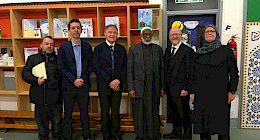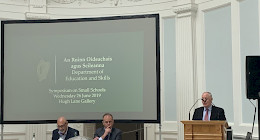
Digital Learning Framework for schools launched

7 years ago
The Minister for Education & Skills, Mr Richard Bruton T.D. has announced that the Digital Learning Framework for schools is being made available to all primary and post primary schools from September 2017.
The Framework provides a roadmap to help schools manage the transformation of teaching and learning as a result of new digital technologies.
The framework will:
- Help schools and individual teachers to plan how to upskill to realise the potential of digital technologies
- Provide for internal and external evaluation of how digital technologies are being embedded across all aspects of school activity
- Support planning in areas like literacy, numeracy and STEM which require a cross-curricular focus.
- The Department will also be seeking a sample of 50 schools to take part in a new trial of the framework. Those schools chosen will receive targeted professional development supports to enable them to fully embrace and engage with digital technologies.
This trial will help refine the Framework so that it can best assist schools to realise the potential of digital technologies. Once learnings from the trial have been incorporated into the framework, the framework will be refined and fully implemented across all schools and teacher education programs. The tool in its current format is still available to schools not participating in the trial to use as they see fit in the meantime.
The Framework complements and supports a range of curricular reforms now underway in both primary and post primary schools including the key skills at Junior Cycle and the planned introduction of Computer Science as a Senior Cycle subject in 2018. A new primary mathematics curriculum is also being developed and it will include elements of computational thinking.
The Implementation Advisory Group, which is led by the Minister, was established to drive forward reforms in how technology is used and taught in the Irish education system has advised on the Framework.
In encouraging schools to avail of this unique opportunity, the Minister noted:
“There is no avoiding the fact that new technology is revolutionising the way our young people access information and the careers they are likely to have in the future. Ensuring that our education system responds to these changes is key to achieving my overall ambition to make Ireland’s education system the best in Europe within a decade.
Developing creative thinking and problem-solving skills is absolutely critical if children are to reach and achieve their potential. In particular, their ability to think critically and to develop solutions in the digital world will be vital for their prospects in life. We want to ensure that Ireland is well placed to take advantage of the digital revolution which is taking place. A number of actions in the Action Plan for Education 2017 and the Digital Strategy for Schools emphasize our commitment in this area. The launch of this Framework is one of those actions and I encourage all schools to engage with it and put themselves forward for the trial to improve it.
School management will have to provide leadership if we are to achieve our goal of embedding digital technologies in teaching, learning and assessment. The Digital Learning Framework for Schools is intended to guide teachers and schools through this process, to mediate and enable this positive transformation, and to build on the valuable work already achieved in this area".
Further information is available at www.education.ie - Digital Learning Framework Webpage
Expressions of interest form is available at: www.education.ie - Expression of Interest Form (Deadline for applying is 2 October 2017)
Trial of the Digital Learning Framework (“The Framework”)
Introduction:
Further to the recent announcement by the Minister for Education & Skills, Richard Bruton T.D., on the development of a new Digital Learning Framework for primary and post primary schools, the Department is inviting schools to express an interest (“Expressions of Interest”) in trialing the Framework in their schools during the 2017/2018 school year.
This presents an opportunity for schools including principals and teachers to participate in a unique and transformative whole school learning experience on the use of digital technologies for teaching and learning in a supported way.
While the Framework will be available to all schools for 2017/18 school year, only those schools selected to participate in the trial will receive intensive support and mentoring from fellow professionals.
It is expected that the Framework will in due course be implemented across all schools and teacher education programmes.
Background to framework
The development of the Digital Learning Framework for schools is a key objective of the Digital Strategy forSchools 2015-2020, Enhancing, Teaching, and Learning which envisages that digital technologies will open up new forms of teaching and learning. It is not enough for technologies to be merely available in the classroom – they should be deeply embedded in all classroom activities by supporting a constructivist approach to teaching and learning. The Digital Learning framework promotes this approach to teaching and learning.
The Framework links with and complements other key Department policies and strategies including the following:
- Curriculum change. The planned introduction of a new mathematics curriculum at primary level will incorporate aspects of computational thinking. At post primary, Junior Cycle already has coding as a short course and Computer Science will be introduced as a senior cycle subject from September 2018.
- Encouragement of more active teaching methodologies across the curriculum
- Teacher professional development
- Student learning and engagement
- Looking at our School 2016 – A Quality Framework for Primary/Post Primary Schools which articulates effective and highly effective practice for the use of digital technologies in the two key dimensions Teaching and Learning and Leadership and Management.
Looking at our School
Schools are already familiar with Looking at our School 2016 – A Quality Framework for Primary/Post Primary Schools. The Digital Learning Framework is closely aligned with it.
The two key dimensions of Teaching and Learning and Leadership and Management are divided into the same four domains which represent the distinct, although interrelated, aspects of each dimension. Standards are then provided for each of the domains.
The Standards are stated as the behaviours and attributes characteristic of practices in an effective, well-functioning school and are again aligned to the 32 Standards contained in the Looking at Our School 2016 – A Quality Framework for Primary/Post Primary Schools.
The Digital Learning Framework provides Statements of Practice which describe “effective” and “highly effective” school practices for each of the 32 standards.
The Statements of Practice:
The purpose of the Standards is to assist schools in identifying the areas of their practice that are effective or highly effective, to identify and prioritise the areas where improvement is needed, and to help them chart an improvement journey.The purpose of the Standards is to assist schools in identifying the areas of their practice that are effective or highly effective, to identify and prioritise the areas where improvement is needed, and to help them chart an improvement journey.
These Statements enable teachers and school leaders to plan how the school makes provision to support the embedding of digital technologies in teaching and learning practices and teachers’ individual practice.
In reflecting on the how the use of digital technologies can enhance the teaching and learning process, school management and teachers will identify those aspects of teaching and learning that are already effective or highly effective and also where improvements are needed.
The Statements will be supported by case studies and exemplars of good practice. Some are already available and more will be developed during the course of the trial period and as digital technologies become embedded in teaching and learning across all schools.
Implementation
Both the Digital Learning Framework and Looking at Our Schools 2016 – A Quality Framework for Primary/Post Primary Schools are designed to provide the widest possible scope to teachers, school leaders and others to identify and achieve excellence in teaching and learning and leadership and management. The Digital Learning Framework recognises that schools are at different stages of the school improvement journey with regards to embedding of the use of digital technologies into teaching and learning.
It is not expected that all aspects of the new Framework will be included in any one self-reflective or evaluative activity. Rather, the Digital Learning Framework should be viewed as an enabler of self-reflection and improvement and not as an inflexible check-list. It is crucial from the outset that the leadership team in each school has a shared understanding of why and how the school seeks to embed digital technologies in teaching and learning and is committed to doing so.
One option for schools is to adopt the methodology of the six step SSE process to implement the Digital Learning Framework. Schools may also choose to adopt the Digital Learning Framework as the area of focus for the development of teaching and learning as part of its SSE process.
The Framework will be accompanied by digital learning planning guidelines – a resource designed to support schools in the embedding of digital technologies in teaching and learning and in the development of a Digital Learning Plan.



